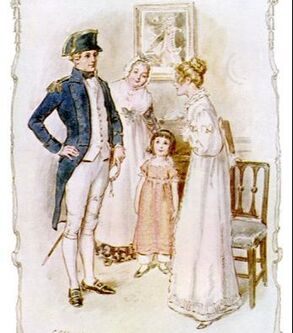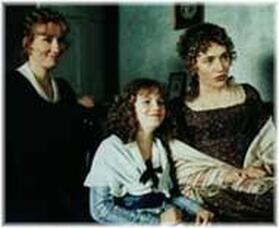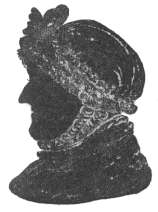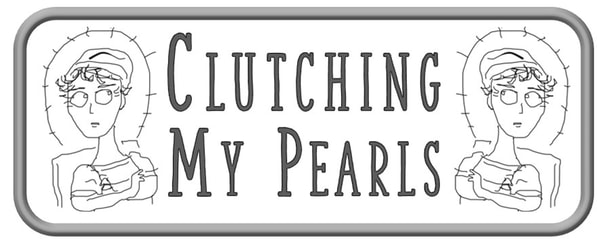| Clutching My Pearls is about Jane Austen and the times she lived in. The opinions are mine, but I don't claim originality. Much has been written about Austen. Click here for the first in the series. In an earlier post I mentioned the faultless behaviour of Adela, a "picture of perfection," who was as dutiful as possible toward both of her unworthy parents. This Mother's Day edition will look at some mother-child interactions, and I'll return to the topic for Father's Day to look at some famous fathers. |
 William, Mrs. Price, Betsey, and Fanny in Portsmouth
William, Mrs. Price, Betsey, and Fanny in Portsmouth Austen supplies most of her heroines with very deficient parents. We are left in no doubt about the faults of the vulgar Mrs. Bennet and Fanny Price’s mother in Portsmouth. Nevertheless, the heroines bear patiently with them to a remarkable degree. If Jane ever asks Mom directly to please please please stop talking about Bingley, we don’t hear about it. There are no scenes where heroines talk back at their parents or complain about them to anyone outside the family.
As Historian Rory Muir explains, “In theory, children were expected to respect, honour and obey their parents, and while the reality was always more complicated and human than such doctrines suggest, a much greater degree of deference was actually exacted than is common today. Society frowned on children – even adult children – who openly quarreled with their parents." So naturally, when 18th century authors wrote moral tales featuring a heroine who was a "picture of perfection," the author could make the heroine an orphan, as many were, or else the heroine ought to behave in an exemplary fashion toward her parents.
As well, her brother William never met his aunt Mrs. Norris until he came to visit Fanny at Mansfield Park, but nevertheless, he was already aware of how awful she was, and this knowledge could only be through Fanny’s letters to him.

This fact is not stated explicitly in the novel, but the expectation comes to the fore in Barbara Hofland’s 1814 novel, The Merchant’s Widow: Handsome young Frederic calls on Louisa Daventree, carrying an invitation from his cousin, Miss Barnet. Louisa and Miss Barnet are friends and she wants Louisa to come spend a week with her and her mother. Mrs. Daventree, the widow of the title, is surprised to learn Miss Barnet is in town: “'I had understood,' said Mrs. Daventree, 'that Miss Barnet had been going to London.'
“'She had intended it fully, madam,'” replied Frederic, 'but when my uncle was ordered to Bath, she very properly declined leaving Mrs. Barnet.'”
Mrs. Daventree, suspecting a budding (but hopeless) romance between her daughter and Frederic, who is staying with the Barnets, instructs her daughter to turn the invitation down: “Louisa, my dear, write a line to Miss Barnet, with proper acknowledgement for her kindness, but inform her I cannot possibly spare you.”
Mrs. Barnet is keeping her daughter away from a man she can never marry due to the disparity in fortune. She is being cruel to be kind. In Mansfield Park, Lady Bertram thinks only of herself when she refuses to let her niece Fanny join a pleasure party for a day-trip to Sotherton. “Oh no! I cannot do without Fanny.” Throughout the novel, Fanny patiently attends upon her lethargic aunt, but we never read of Lady Bertram's own daughters Maria or Julia playing cribbage with their mother or untangling her needlework.
Edmund offers to stay home in her place so Fanny can have the treat. Julia is uncomfortably aware that she should offer to stay home herself. Luckily Mrs. Grant, the clergyman's wife, volunteers herself as a companion for the day to Lady Bertram, so everyone can go (though of course Fanny has a mostly disappointing visit and never gets to see the avenue of oaks she was particularly interested in).
At Sotherton, the other young people are out enjoying the gardens, but Julia is stuck with Mrs. Norris and their hostess, Mrs. Rushworth. Her aunt falls behind, gossiping with the housekeeper, and Julia "was obliged to keep by the side of Mrs. Rushworth, and restrain her impatient feet to that lady’s slow pace" rather than go off and leave her hostess without a companion. Austen tells us, “The politeness which she had been brought up to practise as a duty made it impossible for her to escape; while the want of that higher species of self-command, that just consideration of others, that knowledge of her own heart, that principle of right, which had not formed any essential part of her education, made her miserable under it.”
There can be no mistaking the value which Austen places on being polite and dutiful to one’s elders.
 Mrs. Austen, Jane Austen's mother
Mrs. Austen, Jane Austen's mother But Austen's niece handed down the tale of how, when Austen was growing weak from the illness which would kill her, “she contrived a sort of couch for herself with two or three chairs,” so as to leave the sofa free for her mother. "If she herself had shown any inclination to use the sofa, her mother might have scrupled being on it so much as was good for her."
If you are going to express your love and devotion to your mother, I wouldn’t advise blessing her for the grey hairs and wrinkles she’s acquired as a result of raising you. In a comedic 1794 play by Richard Cumberland, Mrs. Ratcliffe, seeing her daughter Eliza weeping, exclaims:
| Mrs. Ratcliffe: Eliza! Child! What means this more than usual agitation? Eliza: Is it then more than usual? Mrs. Ratcliffe: You weep--- Eliza: Do I? ‘Tis natural, when I contemplate a face so dear and so decayed; furrowed with cares and sorrows for my sake – Ah! my dear mother, you have loved me much too well.” |
| In the third volume of my Mansfield Trilogy, A Different Kind of Woman, Fanny Price has to make a choice between her heart and her duty to her elders. Click here for more about my novels. |


 RSS Feed
RSS Feed